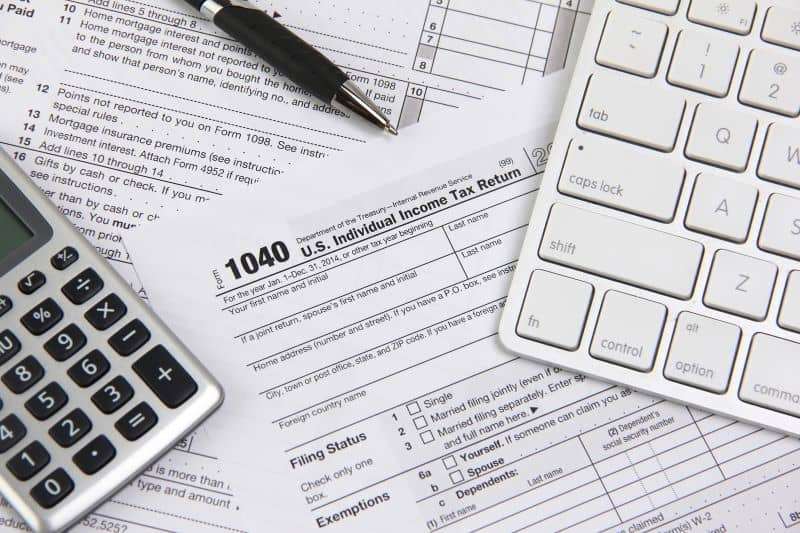Do I Have to File My Tax Return if My Income is Low?
Filing taxes is a common action taken by millions of working Americans. If you qualify as low-income, you might not need to file taxes. Here is how you know whether you need to file taxes, even if you are low-income.
April 15th is traditionally known as Tax Day. As soon as New Year’s Day passes, companies and employees gear up to file their tax documents. When you have a low threshold of income, it can be challenging to decide whether filing taxes is worth the trouble.

You Don’t Need to File Your Tax Return with Low Income
You don’t need to file your tax returns if your income level falls within the proper parameters. If you fall under IRS minimums or if you have no income, you do not need to file a tax return. Low income is defined in the United States as a family whose income is below the national poverty level. Income is how the government determines whether a family qualifies for certain benefits.
There are three levels of low income in the United States: low income, very low income, and extremely low income. Low income means that your family earns less than 80% of the national median income. Very low income means that your family earns less than 50% of the national median income. Extremely low income means that your family earns less than 30% of the national median income.
When is Filing Your Tax Return Absolutely Necessary
It is necessary to file taxes in certain circumstances:
- If you want to receive a tax refund
- If you work within the United States
- If you are self-employed and make over $400
The Internal Revenue Service (IRS) sets minimum income levels for filing taxes. The need to file taxes is also influenced by your filing status and your age.
Your ability to file taxes depends on whether you are single, married filing jointly, married filing separately, the head of the household, or a qualifying widow or widower with a dependent child. Another deciding factor is whether you are over or under the age of 65. The minimum income is set on a yearly basis by the IRS.
It is important to note that not all income is required to be reported to the IRS.
Taxable and Non-Taxable Income
What are the various forms of taxable and non-taxable income that can influence your tax return?
Taxable income is income that must be reported on your federal tax return. There are various forms of income that commonly fall within these parameters while there are others that may seem unfamiliar depending on age or financial situation.
Here’s a list of forms of taxable income
- Salary and Wages: Regardless of whether you make an hourly wage or you are paid a salary, what you earn for work is taxable income.
- Tips: Whether paid in cash, through a credit card or pooled among other workers, tips need to be reported on your tax return.
- Overtime: This is taxed in the same way that regular salary and wages are taxed.
- Bonuses and Perks: If these are employer-paid, they are taxable forms of income.
- Self-Employment: If you have a regular gig or work as a freelancer, you must pay taxes on your income.
- Unemployment: If you receive unemployment benefits, you must pay taxes on them.
- Earned Interest: If you have a savings account, certificate of deposit, or even a checking account that earns interest, then that interest is taxable.
- Prizes and Gambling Proceeds: If you win money on a game show, win the lottery, or win a physical prize.
- Social Security: Depending on how much social security you collect; this could become a taxable form of income.
- Court Settlements: Aside from medical expenses and physical injury, most legal cases that are settled can be taxed.
- Qualified Retirement Fund Withdrawals: If you have a traditional 401k or a traditional IRA, withdrawals are taxable. Roth versions of these retirement items have already been taxed.
- Forgiven Debt: Apart from some student loans and debt erased during bankruptcy, debt that is canceled, settled, or forgiven is still taxable.
- Short-term Rental Income: If you rent out your space through a platform like Airbnb, the IRS views this as taxable income.
Here’s a list of nontaxable income
- Scholarships: Money given towards working on a degree is generally tax-free unless the scholarship money is for living expenses.
- Life Insurance Payouts: Beneficiaries are not taxed for payouts.
- Child Support Payments: Anyone who receives child support does not pay taxes on those payments.
- Alimony Payments: Divorce and separation agreements are not taxable.
- Gifts: While the person giving the gift may have to report it to the IRS depending on how much it costs, the person receiving the gift does not.
- Inheritance: Regardless of what form it takes, inheritance is non-taxable.
- Workers’ Comp: This form of benefit is non-taxable unless the recipient has received or is receiving retirement payments.
- Welfare Benefits: Any income from welfare is non-taxable.
- Employer-provided Health Insurance: This form of health insurance is not taxable.
- Disability Benefits: If you are paid disability benefits or social security disability benefits.
- Cash Rebates: If you made a purchase, rebates provided because of it are not taxed.
- Proceeds from a Home Sale: Depending on how long you’ve owned your house, how long you’ve lived in the house, and how much you sell the house for, the amount you earn from the sale might not be taxable. If you sell a house for over $250,000 ($500,000 if you file jointly with your spouse), then your sale will be excluded from taxes.
What Happens if You Don’t File Your Taxes?
The IRS has various ways of handling late tax returns
If you are from a low-income household, you may not have to file your taxes. If you do not qualify as a low-income household, not filing your taxes can have massive repercussions.
There is a difference between not filing your taxes and filing your taxes late. If you file your taxes late (as in, you file your taxes after the national deadline set to file) then the IRS may include a fine or penalty. The amount of the fine will depend on how much you have in unpaid taxes and how late the filing is.
If you do not file taxes for several years, the IRS will require several years of taxes to be filed for you to be considered tax compliant.
Is Not Paying Taxes a Crime?
If you are unable to pay a tax debt, it is not automatically considered a criminal act. There are two specific instances in which the IRS will look to prosecute.
If you fail to report income on your tax returns, the IRS will consider this as an illegal act. This can be important if you are self-employed or work mostly gigs.
If, during a tax audit, you fail to report certain monetary holdings you have (like a bank account) or you make false statements about your money, the IRS will consider this as a criminal act as well.
What Happens if You Can’t Afford Your Taxes
From deferring payments to payment plans, here are some results if you cannot afford to pay taxes
When you file your taxes, there may be instances where you owe the IRS. If you cannot make a payment on your taxes, there are several ways to handle the situation.
- Not Collectible Status: If you cannot make a payment towards your IRS debt, you can have your payments deferred until you can.
- Short-term Payment Plan: You can make payments towards your IRS debt over the course of 180 days. This plan would handle your payment in full.
- Installment Payments: You can make payments on a monthly basis over a longer timeframe.
- Offer in Compromise: This plan would reduce the overall debt to the IRS.
In Conclusion
Having low income can make you exempt from having to file your taxes. It might be an easy decision if you have no income to speak of. If you qualify as low income, knowing what qualifies you to be responsible for filing taxes is important.
There are multiple forms of taxable income that, even if you do qualify as a low-income tax filer. If you want to receive a tax refund, filing a tax return is mandatory.
If you don’t file your tax return (and you are not considered to be a low-income household) then you will be subject to penalty. This does not mean that you cannot pay off your tax debts if you end up owing the IRS. There are several ways to make payments towards eliminating your tax debt. You can even defer payments if you cannot make a payment at the time.
Simply not paying your taxes will not result in the IRS bringing criminal charges against you. Knowing whether you need to file your taxes is important, even if you qualify as low-income.
In the end, being aware of whether you fall into the low-income category can help you better understand if you need to file your tax return.
Save Money on Your Wireless Phone Service
If you qualify for programs like SNAP, you may also be eligible for Lifeline or the Affordable Connectivity Program (ACP). Lifeline and ACP are government-run programs that help low-income consumers receive free or heavily discounted communication services.
Click here to find out more and apply for this valuable benefit.
Get a Tablet for $10.01
If you qualify, you can get an 8″ tablet for just $10.01. Apply here to get started!
Save Even More with Recommended Resources and Amazon Deals
Looking to save on additional items? You may want to check out our Recommended Resources page. For example, you can learn how to save 50% on Amazon Prime membership and use your EBT card.



